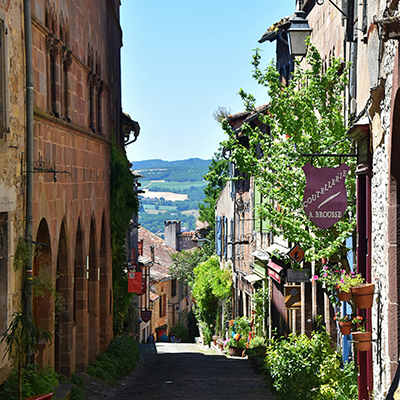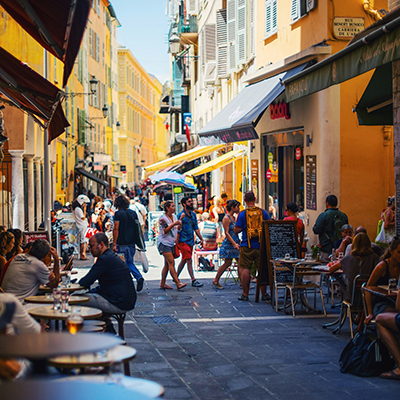How to Travel in France on a Budget
Becky Hart | Mar 20, 2024

With Paris as the host of the 2024 Olympics, everyone has the City of Light on the brain. If you’re inspired by the Games and the images on TV, you might be looking for a way to get in on the action yourself.
Traveling to France, and to Paris in particular, can be an expensive undertaking, though. Flights alone can cost upwards of $1,000 (if you’re flying from some U.S. cities). So how do you travel to France on a budget?
There’s no single answer, but these tricks to seeing France without breaking the bank will set you on the right path.
How to Find Cheap Flights to France
 If you’re still recovering from the news that the cost of flights to France can set you back about a $1,000, don’t worry. You usually can find more inexpensive airfares. It will largely depend on your home airport — a ticket out of New York is significantly cheaper than one out of my hometown of Indianapolis — as well as when you fly, what airline you choose, and whether you decide to fly economy or upgrade.
If you’re still recovering from the news that the cost of flights to France can set you back about a $1,000, don’t worry. You usually can find more inexpensive airfares. It will largely depend on your home airport — a ticket out of New York is significantly cheaper than one out of my hometown of Indianapolis — as well as when you fly, what airline you choose, and whether you decide to fly economy or upgrade.
Like we said in our guide to saving money on flights, staying flexible is the best way to find inexpensive fares. When flying to Paris, compare prices between Charles de Gaulle Airport and Orly Airport. Hopper found that the average flight from the U.S. to Paris was slightly less when landing in Orly.
Outside of Paris, the cities of Nice, Toulouse, and Lyon are considered among the cheapest airports to fly to in France. If you aren’t set on visiting Paris or your itinerary isn’t set and you can visit Paris at any point during your trip, consider flying into an alternative airport, then taking a less-expensive train to your next site.
In addition to being flexible with location, try to stay flexible with when you travel. Certain times of year will be less expensive than others. This goes for flights as well as other travel arrangements like hotels, excursions, and ground transportation.
Traveling during the off-season or shoulder season will usually save you money. For France, that’s November through March. Skyscanner says the cheapest flights to France can be found in February. All of this is because the days are short and rain is more frequent. If you don’t mind a bit of dark and dampness, you could save loads of money.
It’s no secret that which airline you choose also impacts the cost of your airfare. When we Googled “cheap flights to France,” we got a long listing of flights that cost less than $300. A closer look, though, and it was on less traditional airlines, required you to change airlines partway through the trip, or had you making multiple layovers.
Time and convenience are just as valuable as your actual money. If a flight on a less-reputable airline makes your trip harder or your route twice as long, decide if it’s really worth the “deal” they’re offering. And remember, it might not even be a deal financially once you add on all the hidden fees for luggage, drinks and snacks, choosing a seat, and more.
Where to Find Inexpensive Hotels in France
Finding a hotel in France this summer, especially near Paris, will be a struggle because of the Olympics. Demand is high, which means prices go up. Try these ways to find inexpensive hotels and other accommodations in France, even when everyone else is trying to do the same.

Types of accommodations
Look into alternatives to hotels. Hostels, well-known to students and backpackers around the world, will almost always come in cheaper than a traditional hotel. There’s a reason for this. Facilities are basic and you might be bunking with strangers. But if saving money is the goal, hostels check that box.
For something a little more private, look into Airbnbs. These vacation rentals will almost always be less expensive when you’re traveling with a group. Booking and sharing the cost of an entire house tends to be more economical than staying in multiple hotel rooms.
If you’re traveling solo, renting a single room in someone’s home can save money as well. Plus, when your host also lives on site, they can be a great resource for restaurant recommendations and other local hacks that help you avoid overspending.
Whichever type of accommodation you choose, you can usually save money by booking a room away from the main tourist sites. Anything close to Notre Dame Cathedral, for example, will be more expensive than staying farther out in the suburbs.
There is one main exception to this hack, though. Balance your hotel savings with the cost of extra transportation. If you’re going to spend more time and money getting to the places you want to visit, a cheaper hotel might not be the way to go. Your savings won’t be as big as you might think, and you’ll be annoyed you’re wasting precious sightseeing time riding a bus rather than doing what you came for.
Cities off the typical tourist trail
If your heart isn’t set on a specific destination, let your wallet help you decide where to go. Some cities and regions historically are less expensive than the high-demand areas like Paris and Marseille.
Chantilly is about an hour north of Paris, not much farther than Versailles is to the southwest of Paris. Despite being packed with things to do, including its own incredible chateau, it doesn’t draw the same herds of tourists, meaning prices are likely to be lower.
Farther afield to the south, Lyon is often picked as an alternative city to Paris. In a country known for its cuisine, Lyon is said to the gastronomic capital of France. The entire city is also a UNESCO World Heritage Site, the French Alps are nearby, and there’s a wealth of culture and art that you won’t want to miss.
How to Find the Best Inexpensive Restaurants in France
 Speaking of delicious French food ... If you wanted to treat yourself and splurge on some world-class dining, you have your pick of restaurants to do just that. Thankfully, because of its culinary reputation, even inexpensive restaurants in France can deliver dishes that leave your tastebuds tingling.
Speaking of delicious French food ... If you wanted to treat yourself and splurge on some world-class dining, you have your pick of restaurants to do just that. Thankfully, because of its culinary reputation, even inexpensive restaurants in France can deliver dishes that leave your tastebuds tingling.
"If you want to experience high-end French cuisine but are balking at the prices, grabbing a light lunch can avoid expensive dinner fees for large portions,” says Seven Corners travel blogger Grace Lower. “Many elegant establishments will offer lunch menus featuring the same dishes, albeit smaller, so you can sample delectable dishes for a fraction of the cost.”
Another way to save money while eating well in France is by visiting a local market or bakery. You’ll find all the makings of a memorable picnic — baguette, cheese, meat, fruits — in quantities that are perfect for sampling and that don’t require a lot of money.
Lastly, try an app like The Fork. You can choose your city or neighborhood, type of food, and, just as importantly, click the button for special offers. It will give you a listing for matching restaurants offering deals that are perfect for French dining on a budget.
Free and Cheap Things to Do in France
Seeing the Paris Olympics for free
If you happen to be in France during the 2024 Paris Olympics, you can see some of the events and activities for free. The Seine River, for example, is the site of the swimming marathon. While you can't see the finish line without a ticket, you can catch the race along the way from the riverbanks.
The area around the banks of the Seine was designed for free access with large screens to view other goings-on during the Games. And many of the facilities were built with an eye toward sustainability, so even if you’re in Paris after the Olympics, you’re likely to see a transformed city with a touch of the Olympic flare still in evidence.
Classic — and inexpensive — activities in France
 While standard landmarks throughout Paris such as the Louvre and the Eiffel Tower are obvious stops for many, there may be some more affordable — or free — hidden gems you haven’t considered.
While standard landmarks throughout Paris such as the Louvre and the Eiffel Tower are obvious stops for many, there may be some more affordable — or free — hidden gems you haven’t considered.
“Parks, public gardens, open-air galleries, and river walkways are all beautiful areas to visit without blowing your budget,” says Grace. “In the summer, many of the cities and rural areas host free events and festivals, offering guests a closer look at the culture and tradition of the area.”
Along those same lines, try touring part of France by bike. With the exception of the Pyrenees and the Alps, where you’ll need legs of steel to get around, much of France is more conducive to casual bicyclists and families. Unless you’re stopping for tours or snacks along the way, your only expense would be the cost of renting a bike.
Popular bike routes — and there are many given that it’s home to the Tour de France — include the Burgundy Vineyard Route, where even if you aren’t sipping, there’s plenty of scenery to enjoy; the Île de Ré along the coast; and the Canal du Midi Cycle Path, which although long, is flat and full of history and interesting towns to explore.
If you’re heading to France for the palaces and the art that fills them, you might be surprised how many inexpensive options you have. The Palace of Versailles is probably the most popular to visit, and tickets can be on the more expensive side, especially if you want to see special exhibits and shows.
However, visit Versailles on the first Sunday of the month November through March, and admission to the entire estate is free. Certain groups, including travelers who are disabled, non-European Union residents under the age of 18, and others, are also eligible for free or reduced-price tickets. The Park and Gardens at Versailles are usually free, regardless of the day or time of year.
The Petit Palais art museum in Paris offers free admission to its permanent collection. The Château de Villandry and Château Royal de Blois in the Loire Valley do charge admission, but adult tickets will typically run you less than €15. Given all that’s included in the price of a ticket — access to the châteaux, gardens, art exhibits, and more — it's not bad value for the money.
Travel Insurance for a Trip to France – Even on a Budget
When you’re traveling on a budget, it’s easy to cut corners on things you think don’t matter. Make sure travel insurance stays on your list. For a relatively small price, you can protect your financial investment, health, and belongings. Like those palaces, that’s good value for your money.
If you have to cancel or interrupt your trip, travel insurance can reimburse you for prepaid, nonrefundable trip expenses. That means money back in your pocket.
If you get sick or hurt while traveling, travel medical insurance can cover medical expenses. Because most health insurance doesn’t follow you when you go abroad, having travel insurance means you don't have to pay for treatment out of your own savings.
Traveling on a budget doesn’t mean you should make sacrifices that impact your health and safety. Get a quick quote for travel insurance or talk to our licensed agents about protecting your trip to France.
Search Posts
Receive our monthly inspiration and travel tips from the travel insurance experts.
Sign me upThis website and various social media updates provided by Seven Corners contain content, information, articles, videos, and links to websites created by third parties. Seven Corners, its owners, and its employees neither endorse nor are responsible for the accuracy, timeliness, or reliability of any third-party information, statements, opinions, or advice and are not liable for any loss, harm, or damage caused by your reliance upon them. Use of such information or the linked websites is entirely at your risk. Concerns regarding this third-party content should be directed to the third party. Seek professional advice, as appropriate, regarding your use of such information and websites.
Because the information on this website and in Seven Corners’ blogs and other social media is written and compiled using knowledge and information available at a certain point in time, it may become outdated. For that reason, information, events, legal requirements, and product changes (including benefits, limitations, exclusions, and services) may not be up-to-date, complete, or accurate at the point in time it is being read. Again, use of such information is at your risk.
